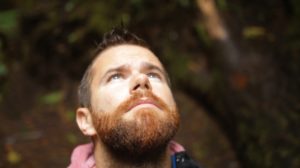In 2013, when Laura Marie Wayne heard that her best friend of 14 years, Nanaimo-raised Scott Jones, had been a victim of a targeted homophobic attack on the streets of New Glasgow, Nova Scotia, she quickly packed her suitcase and boarded a plane to be at his side. She brought her camera with her and, only five days after Scott’s attack, she began filming at the hospital. What unfolded was the award-winning Love, Scott, a deeply intimate portrait of Scott’s recovery and his new life as a paraplegic over the course of the next two years.
“Initially, when he was attacked, there was just that gut response that I needed to bring the camera, and I didn’t even know why,” says Wayne. “In a way it seems like it could be really invasive, but it didn’t feel like that. It felt like the camera needed to come, that somehow through the camera there was a power and an opportunity for justice and catharsis, because a camera is a really powerful witness.”
Wayne, a first-time feature-length director, beautifully and organically captures Scott’s most vulnerable and triumphant moments through coming to terms with being a victim of a targeted hate crime and the daily challenges of life in a wheelchair. One huge difficulty for Scott and his loved ones was and continues to be the lack of support from the justice system.
“The victim services did not advocate for him in any way; he had no opportunity to meet the lawyer who was defending him before he actually went to trial, and then the thing that was most important to him—that this was recognized as a hate crime—was never explored or taken seriously by the police,” says Wayne. “So that was a really devastating part of all of this, just to feel that the institutions of power in this country were not able to hear and respond to his experience as a gay person.”
Nevertheless, the outpouring of love from Scott’s support systems following his assault and his court case was astonishing, particularly from the queer community and from his family. More astonishing, however, are the ways in which Scott has persevered with kindness and empathy throughout his recovery.

“His story is so full of sorrow and grief and tragedy, and also at the same time there is so much resilience and so much love and they’re both present there, like this darkness and this light, and I feel like it was important to me in making the film to honour that,” says Wayne. “Even though this horrible thing happened, there has been a tremendous opportunity to keep showing up with love in the face of the worst circumstances.”
Love, Scott, is produced and distributed by the National Film Board of Canada, as is That Higher Level. When Victoria-born, Vancouver-based, and award-winning film director John Bolton was approached about directing That Higher Level, he was ecstatic for the opportunity to follow the National Youth Orchestra of Canada (NYOC) and capture the orchestra’s most ambitious tour yet across the country. Now, that movie is having its world premiere at the Victoria Film Fest.
“I’ve made quite a few short films about and with classical musicians, and I’ve always wanted to make a film about a symphony orchestra because, to me, the symphony orchestra is the greatest human invention,” says Bolton. “So the film was something I was asked to do, but it was also something that I had always wanted to do. It really was a literal dream come true.”
Bolton gracefully captures the ambition and sacrifice of the young classical musicians who make up NYOC, the top orchestral finishing school in the country. The film focuses on three different types of conflict: the musicians’ inner conflict in handling the pressure; their conflict with the difficulty of the music; and the conflict within the music itself. For the last of these, the students focused much of their effort on Richard Strauss’ “Death and Configuration.”
“‘Death and Configuration’ is a really dramatic piece of music—it tells the story through music of an artist on his deathbed looking back on his life and literally struggling to stay alive and fighting against death,” says Bolton. “It’s a piece of really extreme emotions, and I could tell as soon as I got there and started talking to the kids about the music that this was the piece that they were the most excited about playing and that it was going to be the most challenging piece for them intellectually, physically, and, especially, emotionally.”
That Higher Level demonstrates how the members of the orchestra, who range in age from 16 to 28 years old, confront and overcome their own personal and professional challenges and come together in the pursuit of excellence to form the impressive ensemble.
“The wonderful thing about an orchestra is that it’s not just a metaphor for a community or a society, it is a community and a society… and it’s just an epic journey they go on,” says Bolton. “And as the conductor says in the film, this orchestra made up of these musicians will never exist again. They started as 100 individuals and by the end of the summer—and hopefully by the end of the film—you will see them come together as one musical organism, all playing together as one, and hopefully through the film thatorchestra will live on forever, in a way.”
Victoria Film Festival
Various times, Friday February 1 to Sunday, February 10
Various prices and venues
victoriafilmfestival.com
